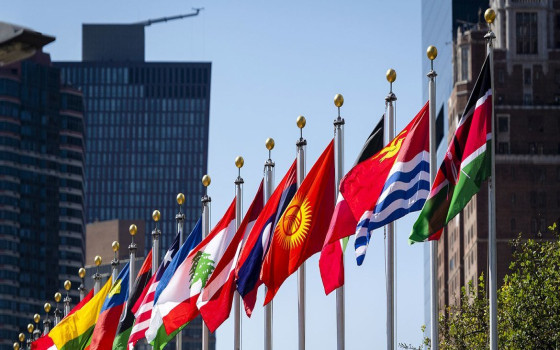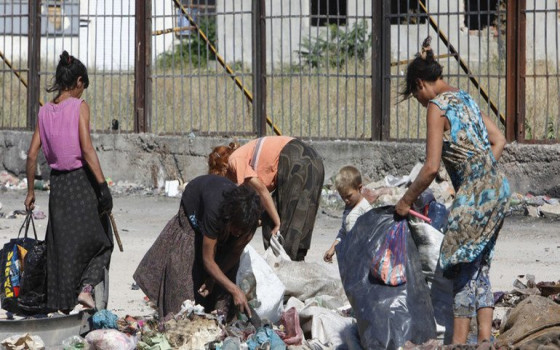United Nations Trade and Development Organization 60 years of work... We need one global market and one global economy, where there is no place for poverty and hunger.

- Europe and Arabs
- Thursday , 13 June 2024 13:19 PM GMT
Geneva: Europe and the Arabs
United Nations Secretary-General António Guterres stressed that the right to development is closely linked to trade, which the poorest countries in the world have the right to seek to achieve on fairer terms, warning that these countries are now “mired in debt” through no fault of their own. According to what was stated in the daily United Nations news bulletin, a copy of which we received on Thursday morning
In a speech on the occasion of the 60th anniversary of the United Nations Trade and Development Organization - formerly known as the United Nations Conference on Trade and Development (UNCTAD) - the Secretary-General highlighted the multiple challenges standing in the way of a more sustainable and inclusive global economy.
Speaking at the United Nations Trade and Development Leaders Forum in Geneva on Wednesday, the Secretary-General said, “New and protracted conflicts are having a ripple effect across the global economy. Global debt has risen while key development indicators, including poverty and hunger, have declined.”
Exposing the flaws of the global system
Mr. Guterres repeated his previous warnings that the international financial structure in the world has become “outdated, ineffective and unfair,” noting that the international financial structure has failed to provide a safety net for developing countries mired in debt, noting that the international trading system faces pressures “from all sides.” parties,” to the point where it now “teeters on the brink of disintegration.”
Against this extremely worrying background, and in the midst of escalating geopolitical tensions, growing inequality and rising debt, Guterres stressed that the role of the United Nations Trade and Development Agency, based in Geneva, has become “more important than ever” in working for a more sustainable and inclusive global economy. , through trade and investment.
The UN agency cannot be neutral on development problems - “just as the World Health Organization cannot be neutral on malaria,” the Secretary-General said, referring to the famous words of Raoul Prebisch, the first Secretary-General of UNCTAD.
He added that trade has become a double-edged sword: “a source of prosperity and inequality; interdependence and dependence; economic innovation and environmental degradation.” He urged greater dialogue between countries in the face of an almost tripling of trade barriers since 2019, “many of which are due to geopolitical rivalry, without attention to their impact on developing countries,” according to the Secretary-General.
Guterres said that the world cannot tolerate divisions into competing blocs, stressing the need for a single global market and a single global economy, where there is no place for poverty and hunger, with the aim of implementing the sustainable development goals and ensuring the achievement of peace and security.
Artificial Intelligence: The biggest revolution since the invention of the Internet
On the other hand, the Secretary-General of the United Nations, António Guterres, described artificial intelligence as "the biggest revolution since the invention of the Internet - and perhaps even bigger than that." This came during a speech he delivered at the International Telecommunication Union Council in Geneva, today, Wednesday, indicating that artificial intelligence can help drive sustainable development, promote social justice, and transform our lives for the better.
He described the ITU's AI for Good platform as a great example of how sharing best practices across borders and sectors can drive meaningful change.
The Secretary-General said that the Global Summit on Artificial Intelligence for Good - held last month - which witnessed the presentation of more than 400 projects by 47 UN agencies - highlighted how artificial intelligence can enhance climate action, health, lifelong learning, Disaster response, and many other areas – especially in developing countries.
However, AI also poses severe – even existential – risks that range from entrenching prejudices to undermining trust and social cohesion, disrupting labor markets, threatening privacy and human rights and even endangering international peace and security, according to the Secretary-General.
Guterres said that artificial intelligence tools are being deployed today with few safety barriers and caution, noting that the pace of innovation exceeds the ability to regulate it, stressing the need for us to unite our forces to ensure that artificial intelligence does not enable the reinforcement of inequality, adding by saying: “Such a unique challenge requires... Unique solutions.
Four areas of work
António Guterres said the high-level advisory body on artificial intelligence he established last year set clear priorities for action:
First, establish an international scientific committee on artificial intelligence that can provide regular, independent scientific advice.
Second, there is a need for regular policy dialogues – linking existing public and private initiatives at all levels – so that we can build on successful governance initiatives and better coordinate existing efforts.
Third, there is a need to unify standards for both regulatory bodies and the artificial intelligence industry, warning that division would particularly harm developing countries and small companies.
Fourth and finally, developing countries need technical assistance and investments – in data, computing power, and talent – to fully participate in and benefit from the AI revolution.
United Nations office on artificial intelligence
The Secretary-General said that ITU’s work to build capacity in developing countries – as demonstrated by the AI for Good Impact initiative – is an important part of our efforts to prevent a new division in the field of artificial intelligence that will only exacerbate existing inequalities.
He welcomed the Advisory Body's proposal to establish a United Nations Office on Artificial Intelligence that would naturally work in close cooperation with the International Telecommunication Union in its efforts to promote a coordinated, coherent and integrated global approach for all.














No Comments Found